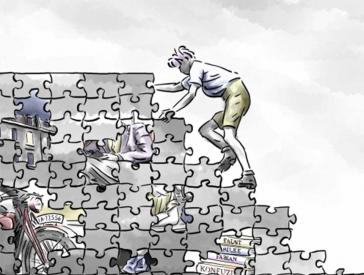JMB Journal 19:
Revolutions
Revolution—the term is derived from the Latin revolutio, meaning “upheaval.” A revolution is always preceded by the realization that the existing order must be dissolved, changed, or at least reinterpreted. We are devoting this issue of JMB Journal to the major and minor upheavals that change the world.
It is said that Jews have a particular penchant for protest, but is there something to this claim? Moshe Zimmermann examines this question in his article. You will also read about the three major Jewish revolts of antiquity, the impact of the Polish protests of 1968 on the country’s Jewish population, and the new ways in which the digital revolution allows us to represent history and portray our modern world. Program Director Léontine Meijer-van Mensch discusses museum revolutions in an interview, and two diaries from our family collections present different perspectives on the historical revolution of 1918 and its consequences.
“What revolution would you welcome?”
We posed this question not only to businesswoman Susanne Klatten and writer David Grossman, recipients of this year’s Prize for Understanding and Tolerance, but also to the staff of Securitas, who work as hosts in our museum and look after our visitors. Their answers are sometimes surprising, some highly personal and others global in outlook.
With texts by Moshe Zimmermann, Léontine Meijer-van Mensch, Peter Schäfer, Nina Breher, Cilly Kugelmann, Jörg Waßmer, Heinrich Heine and with photos by Stephan Pramme.
Note on the print edition: The portrait of Heinrich Hoffmann on page 23 does not show Kurt Eisner (1867-1919), but Gustav Landauer (1870-1919). Landauer was a writer, an anarchist and war opponent; in November 1918 he joined the Eisner government in the service of the Munich Revolution.
You can order this publication by contacting
JMB Publications
publikationen@jmberlin.de



 X
X




